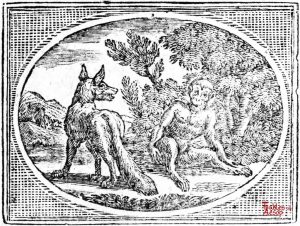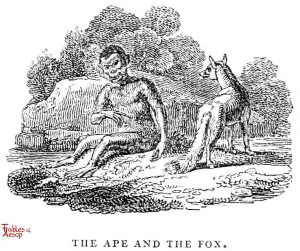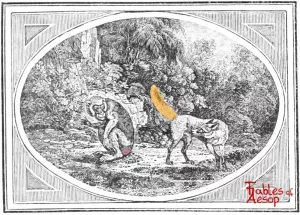An Ape asked a Fox for part of his tale to help cover him. The Fox pointed out that his tail was not built to cover an Ape.
Be content with your station.

L’Estrange version
An ape that found many inconveniences by going bare-arse, went to a fox that had a well-spread, bushy tayle, and begg’d of him only a little piece on’t to cover his nakedness: For (says he) you have enough for both, and what needs more than you have occasion for? Well, John (says the fox) be it more, or be it less, you get not one single hair on’t; for I would have ye know, sirrah, that the tayle of a fox was never made for the buttocks of an ape.
Moral
Providence has assign’d every creature its station, lot, make and figure; and ’tis not for us to stand correcting the works of an incomprehensible wisdom, and an almighty power.

Samuel Croxall
THE Ape meeting the Fox one day, humbly requested him to give him a piece of his fine long brush tail, to cover his poor naked backside, which was so exposed to all the violence and inclemency of the weather: for, says he, Reynard, you have already more than you have occasion for, and a great part of it even drags along in the dirt. The Fox answered, that as to his having too much, that was more than he knew; but be it as it would, he had rather sweep the ground with his tail as long as he lived, than deprive himself of the least bit to cover the Ape’s nasty stinking posteriors.
THE APPLICATION
One cannot help considering the world, in the particular of the goods of fortune, as a kind of lottery; in which some few are entitled to prizes of different degrees; others, and those by much the greatest part, come off With little or nothing. Some, like the Fox, have even larger circumstances than they know what to do with, insomuch that they are rather a charge and incumbrance, than of any true use and pleasure to them. Others, like the poor Ape’s case, are all blank; not having been so lucky as to draw from the wheel of Fortune, wherewith to cover their nakedness, and live with tolerable decency. That these things are left, in a great measure, by Providence to the blind uncertain shuffle of chance, is reasonable to conclude from the unequal distribution of them; for there is seldom any regard had to true merit upon these occasions; folly and knavery ride in coaches, while goodsense and honesty walk in the dirt. The All-wise Disposer of events does certainly permit these things for just and good purposes, which our shallow understanding is notable to fathom; but, humanely thinking, if the riches and power of the world were to be always in the hands of the virtuous part of mankind, they would be more likely to do good with them in their generation, than the vile sottish wretches who generally enjoy them. A truly good man would direct all the superfluous part of his wealth, at least, for the necessities of his fellow-creatures, though there were no religion which enjoined it; but selfish and avaricious people, who are always great knaves, how much soever they may have, will never think they have. enough; much less be induced by any consideration of virtue and religion to part with the least farthing for public charity and beneficence.

Thomas Bewick (The Ape and The Fox)
An Ape meeting with a Fox, humbly requested he would be so good as to give him some of the superfluous hair from his bushy tail, to make into a covering for his bare posteriors, which were exposed to all the inclemency of the weather: and he endeavoured to further his suit by observing to Reynard, that he had far more than he had any occasion for, and a great part even dragged along in the dirt. The Fox answered, that as to his having too much, it was more than he knew; but be it as it would, he had rather sweep the ground with his tail as long as he lived, than part with the least bit of it for a covering to the filthy posteriors of an Ape.
APPLICATION.
Riches, in the hands of a wise and generous man, are a blessing to the community in which he lives: they are like the light and the rain, and diffuse a good all around them. But wealth, when it falls to the lot of those who want benevolence and humanity, serves only as an instrument of mischief, or at best produces no advantage to the rest of mankind. The good man considers himself as a kind of steward to those from whom fortune has withheld her smiles, and thus shews his gratitude to Heaven for the abundance which has been showered down upon him. He directs the superfluous part of his wealth at least, to the necessities of such of his fellow-creatures as are worthy of it, and this he would do from feeling, though there were no religion which enjoined it. But selfish avaricious persons, who are generally knaves, how much soever they may have, will never think they have enough, much less be induced, by any consideration of virtue or religion, to part with any portion for the purposes of charity and beneficence. If the riches and power of the world were to be always in the hands of the virtuous part of mankind, it would seem, according to our human conceptions, that they would produce more good than in those of the vile and grovelling mortals, who often possess them. Without any merit, these move apparently in a sphere of ease and splendour, while good sense and honesty have to struggle in adversity, or walk in the dirt. But the all-wise Disposer of Events does certainly permit this order of things for just, good, and wise purposes, though our shallow understandings are not able to fathom them.

Simia et Vulpis Cauda
Simia sentiens se nudam retro et videns ex adverso vulpem praelonga ac larga cauda instructam, coepit eam rogare ut sibi partem caudae suae daret ad tegendas nates; ita enim fieri communi utriusque emolumento, ut illa importuno onere levaretur, ipsa iuvaretur. Ad quae vulpes, nasum torquens, “Oppido quam falleris, soror,” ait, “cauda enim mea non oneri, sed honori meo servit et, utut sit, mallem ea terram verrere quam tuas tegere impuras nates; ita quaeque nostrum, suis contenta, vivat.”
Perry #533


